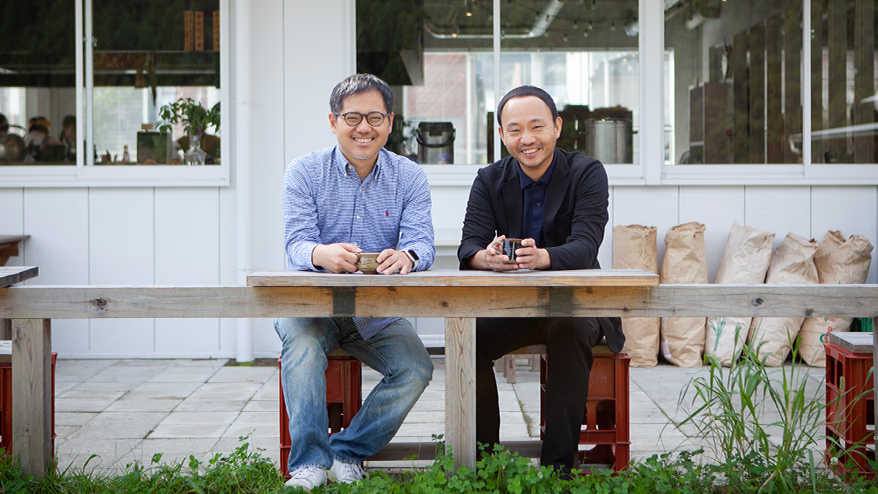モノサスとつながる方々それぞれの「ものさし」をインタビューしている、「めぐるモノサシ」。今回登場していただくのは、鷲尾和彦さんです。戦略コンサルティングやクリエイティブディレクション、文化事業プロデュースなど、多様な領域での経験を活かし、これまで数多くの企業や地方自治体の仕事を支援してきた鷲尾さん。2006年からは、オーストリアのリンツで行われている、芸術とテクノロジーの祭典、アルスエレクトロニカ・フェスティバルに毎年足を運び、テクノロジーが人と社会をどのように変えるのかについてリサーチを続けています。
今年の同フェスティバルには、鷲尾さんのアテンドのもと、代表の林も初訪問。アートとテクノロジーがどのように都市全体を活性化させるのか、また、文化とは? これからの都市とは…? 鷲尾さんの「ものさし」に迫るべく、旅の報告会を行った神山でインタビュー。フードハブ・プロジェクトの食堂、かま屋で朝早くお話をうかがった様子を、前後編に分けてお届けします。
(インタビュー構成:田中亜希)
-
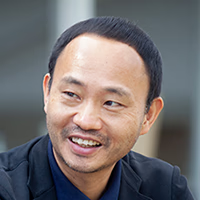
-
鷲尾和彦さんプロフィール:
クリエイティブ・プロデューサー(株式会社博報堂)
戦略コンサルティング、クリエイティブ・ディレクション、文化事業の領域で、数多くの企業や地方自治体とのプロジェクトに従事。プリ・アルスエレクトロニカ賞「デジタルコミュニティ」「ネクストアイデア」部門審査員(2014〜2015年)。主な著書に『共感ブランディング』(講談社)、『アルスエレクトロニカの挑戦~なぜオーストリアの地方都市で行われるアートフェスティバルに、世界中から人々が集まるのか』(学芸出版社)等。現在、東京大学大学院工学系研究科都市工学専攻「地域デザイン研究室」にも在籍。
テクノロジーの発展が、どのような生活の質を生み出すのかに興味があるんです
林
鷲尾さんは『アルスエレクトロニカの挑戦』という本も出していらして、今や、アルスエレクトロニカ(以下、アルス)の第一人者的存在なわけですが、このフェスティバルには12年前から毎年足を運んでいらっしゃるんですよね?
鷲尾
そうですね。2006年からずっと行っています。
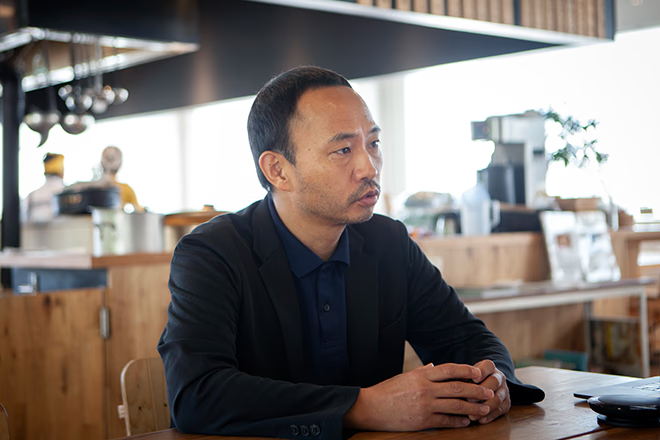
クリエイティブ・プロデューサーの鷲尾和彦さん
林
今年は、私をはじめ神山町の役場のメンバーや NPO グリーンバレーの方など、10名ほどをアルスに連れて行って下さいました。今年のアルスはいかがでしたか?
鷲尾
新しい発見がとても沢山ありましたよ。今回は、林さんや神山の方々と一緒に行くことができて本当に良かったです。町役場の方もいらっしゃったので、アートイベントだけでなく、リンツの市長や行政担当の方々、リンツ市のスタートアップやクリエイティブ産業の拠点などいろいろな場所に行きましたね。アートイベントを成り立たせている都市の状況もみんなで見て回り、毎日一緒に意見をシェアしあえたのはとても有意義でした。誰でもついつい目立つところに目が向かいがちだし、どうしても自分の「ものさし」を頼って見ようとしてしまうものだから、いろんな立場の方々と同じものを一緒に見てみるって、やっぱりとても大切なことなんだなあって改めて感じていました。
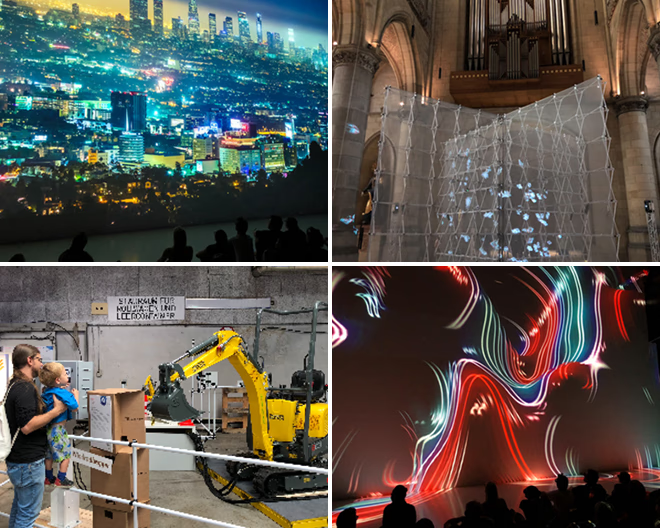
「エラー」がテーマだった今年のアルスエレクトロニカ・フェスティバル
※ アルスエレクトロニカ・フェスティバル
1979年からオーストリア第3の都市、リンツ市で開催されている「アート・テクノロジー・社会」をテーマにした世界的なイベント。1987年からは国際コンペティション「アルス・エレクトロニカ賞」も開催、コンピュータアニメーションやデジタルミュージック、インタラクティブアート、などの部門で革新をもたらした作品に賞を授与する。コンピューター界のオスカー賞とも呼ばれている。運営しているのはリンツ市の公社である、アルスエレクトロニカ社。
林
僕は今回アルスに初めて行ったのですが、パフォーマンスや作品から多くの問いかけを感じました。そして、それを、同行したメンバーはどう捉えているのかなと想像しながら、自分の考えを整理してみたり…。それから、アルスでやっていることを神山に取り入れるとしたら、どうすればいいのかなと考えましたね。
鷲尾
アルスエレクトロニカを運営しているオーストリアのリンツ市と、神山町とでは、もちろん自治体としての規模は全然違います。しかし、現象だけを見ているんじゃないなくて、それを動かしている原理のようなものを探ろうとすると、たくさんヒントは見つかると思うんです。結局、人がやっていることだから。日本でも、自治体や企業で「アルスみたいなことをやりたい」という人は実はいっぱいいて、相談されることも多いのですが、僕はいつもそのようにお話ししています。文化ってその場所で生まれて育つものだから、表面だけ真似ようとしても上手く行かない。綺麗な花だからって摘んできて違う場所に植えても、すぐに枯れてしまうように。
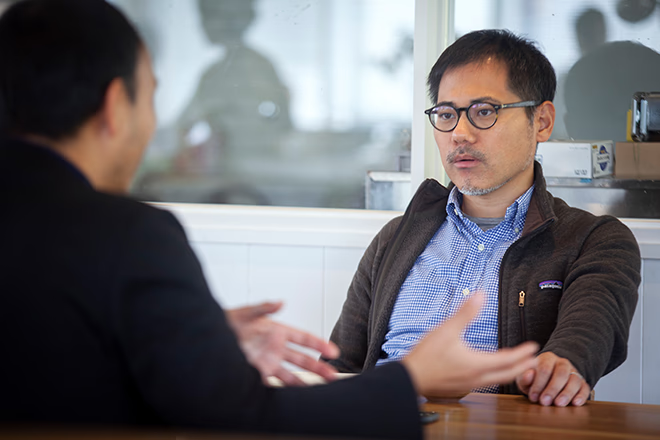
お話をうかがった、モノサス代表の林
林
そもそも、鷲尾さんがアルスに行くようになったきっかけは何なのでしょう?
鷲尾
2006年頃って、ブログなどのソーシャルメディアが登場して、Facebook が一般向けサービスとして始まるというような時でした。その時期に国内や海外のカンファレンスなどに行くと、どこでも「インターネットの技術を使ってこんなビジネスをやるんだ」という話に終始しているわけです。ビジネスの話も勿論いいんだけれど、もっとその大前提というか…、メディアテクノロジーの発達によって、これからどういう「生活の質」が生まれるのだろう、社会のあり方ってどんな風に変わっていくのだろう、というような。言ってみれば“生活者”の立場、そして人と社会がどんな風に変わるんだろうかという視点が、ずっと気になっていたんです。
問いを受け取れる人がいて、
ようやく意味のあるイベントになる
鷲尾
そんな時に、ジャーナリストの渡辺保史さんとご一緒にお仕事をする機会があって。渡辺さんは『情報デザイン入門』という書籍も執筆されているジャーナリストの方でした。しかも、渡辺さんは1997年にアルス・エレクトロニカ賞で金賞を受賞している「センソリウム」というプロジェクトのメンバーだったんです。渡辺さんに僕の関心テーマをお話ししていたところ、同じ「センソリウム」のメンバーである西村佳哲さんを紹介して下さって…。
林
ここで西村さんが登場するんですね。西村さんには、この「めぐるモノサシ」にも出ていただいています。
鷲尾
渡辺さんに紹介いただいて西村さんにお会いしたら、「じゃあ、アルスに行ってみたら?」と軽い感じで薦めて下さって。
林
軽く(笑)
鷲尾
はい。でも、アルスって名前は聞いたことあった程度で、でもメディアアートのイベントだと言われてもどういうものなのかよく分からないし、ましてやリンツってどこ?みたいな(笑)。直前だったからホテルも空いてないし。だけど気になるので、バックパッカーみたいな状態で、ひとりでそれでもリンツを目指しました。
林
行ってみてどうでした?
鷲尾
リンツって、中心市街地もこじんまりしていて、とてもコンパクト。街と自然も近いし、街中の雰囲気もある種オーセンティックな感じなんですよね。今はずいぶん小綺麗になったけど、もっと田舎っぽい印象でした。なので、こういう街でどうしてアートとテクノロジーを用いたアートフェスティバルをやっているのかと、最初は不思議な感じでした
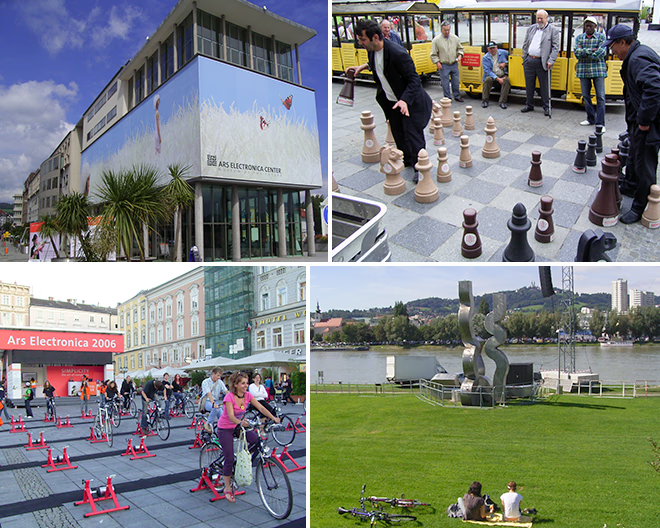
鷲尾さんがはじめて訪れたときのオーストリア・リンツ市。
初期のアルスエレクトロニカ・センター(左上)、中央広場(右上、左下)、ドナウ川沿いの公園(右下)
鷲尾
驚いたのは、メインカンファレンスに参加してみると、僕がさっき言ったような、まさに「テクノロジーが人や社会をどんな風に変えていくのか」って視点でずいぶん熱心な議論をやっているわけです。登壇している人たちも、アーティストもいれば、建築家もいる。国籍だって様々。若い大学生たちも沢山聞いている。会場の外はドナウ川の綺麗な風景が広がっている。フラットでオープンな感じがしましたね。その時のテーマは「シンプリシティ(Simplicity)」でした。
林
「シンプリシティ」?
鷲尾
「シンプリシティ」って、当時MITメディアラボの副所長を務めていたジョン前田さんの著書『シンプリシティの法則』からの引用なんですが、この本は「物事をいかに簡潔に、理解しやすい状態にするか」ということについて書かれたものです。日本語で「シンプル」というと単純化するという意味合いが強いけれど、そうではなくて、「シンプリシティ」とは、情報や社会が複雑化していく中でどのようにすれば「美しく、より伝わり、より実用性を高められるか」という意味です。デザインやテクノロジーが発達し、まさにソーシャルメディアで大量の情報が生み出される時代を迎えている最中に、そのことを議論しているということに最初すごく驚いたし、面白いなあって感じました。
林
でも、そこで話を聞いたり、フェスティバル全体を見て、鷲尾さんとしては明確な答えを得られなかったとか?
鷲尾
そうなんです。このイベントはいったい何なんだろう、って。大きな問いを受け取った感じですね。帰国後、会社の中で報告会をしたところ、もう全く評判が悪くて。「そんな仕事にすぐに使えない話、何のためにしてんだ」「アート?なに遊びに行ってんだ」ってケチョンケチョンですよ。まあ、事実そうなんですけどね。
でも、あのイベントは、そうした「問い」を投げかけてくれる場所だし、それを一緒に考えようとするから良いイベントなんです。それは感じていました。それに確かにとても重要な「問い」だと思ったし。この思いを当時の上司に話したところ、「一度足を運んでみてもわからないんだったら、また来年も行けばいい」と言ってくれました。
林
素晴らしい上司の方ですね。
鷲尾
今もずっとそのことには感謝しています。渡辺さんや西村さん、そして当時の上司が励ましてくれたからこそ、今があると思っています。それ以降、結局毎年メディアテクノロジーと社会の変化をリサーチするという目的でリサーチャーとしてアルスに行くようになりました。
街に住んでいる人に、どんな生活の質を
届けるのかということが重要
林
鷲尾さんが以前おっしゃっていたことで、印象に残っている言葉があります。それは、「文化芸術そのものの推進だけではなく、文化芸術を活かして都市全体を活性化するということに興味がある」ということ。鷲尾さんのなかでは、文化芸術そのものが大事なのか。もしくは、それを街の活性化に活かしていくことのほうが大事なのか。どちらなんでしょう?
鷲尾
「文化と都市」は僕にとって一番のテーマです。文化は、その土地で、その街で暮らしている人たちが時間をかけて選び取ってきた結果とその蓄積だと思うんです。その場所の歴史や風土、記憶、その上で生まれてきた様々な生活の営み、生活の思想、何を大切にして残してきたか。それが文化です。
ワインの※「テロワール」って言葉がありますよね。原材料のブドウが育つ場所や気候、土壌、技術によって、その土地ならではの独自の味や特徴が生まれる。これが「文化」だと思うんです。
※ テロワール 場所や気候、土壌など、ワインが生まれるために不可分な環境のこと
林
たしかにそうですね。
鷲尾
リンツはもともと工業の街だったので、その土地の特性を大切にしながら、いかに将来に持続させていくかという発想があって、それでアートとテクノロジーを用いた市民向けのお祭りとしてアルスエレクトロニカ・フェスティバルが生まれているんです。この原理から考えると、モノサスさんが神山町で展開している「フードハブ・プロジェクト」や “地産地食”の食堂「かま屋」も、実は原理としては同じなんだと思うんです。自然豊かで農産物が豊富に収穫できる場所だから成り立つ、街の持続性を高める事業ですよね。その土地の状況によって、生まれてくる現象が変わるというだけなんです。
林
リンツという土地は、アルスが毎年開催されることで街が息づいているわけですよね。それを日本の状況に照らし合わせてみると、日本は人口の多い都市に様々な物事が集中しすぎています。それは、GDPにも表れてきますが、人口が偏りすぎている東京都市圏のGDPの値は凄まじいものがあって、その数字は韓国1国よりも大きいそうなんです。だけど、東京の出生率は、国内の都道府県のなかでは断トツで最低。
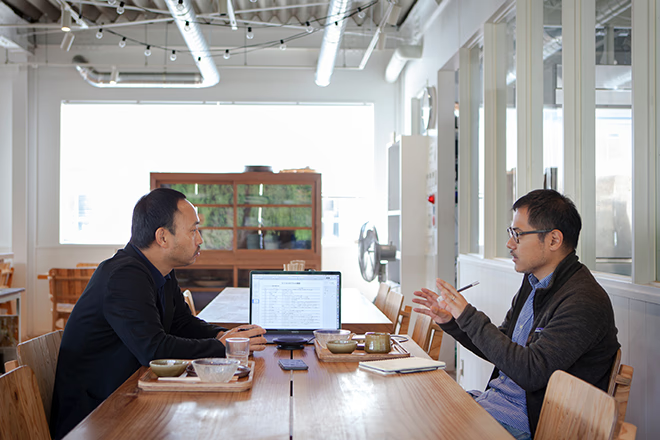
鷲尾
ブラックホール状態ですね。
林
GDPを多く生む東京には、たくさんの人と仕事が存在する。この状態を地域に分散できないのかと思うけれど、地方には仕事が少ないのが現状です。そうやって紐解いていくと、人が「生活したい」と思う土地になろうとすると、文化よりビジネスのほうが重視されがちなんじゃないかと。でも、そうするとカルチャーの匂いがなくなるのでは? と思うんです。ところが、アルスはカルチャーがメインになっているように見えます。この理由は、なぜなんでしょう。
鷲尾
いや、正確に言うと、アルスはカルチャーがメインではないんですよ。文化(カルチャー)だけ切り出して存在しているわけではないんです。面白いイベントだから、確かに観光客も来るけど、それが目的になっているんじゃなくて、むしろ街の個性や特長を伸ばすために文化的な体験を市民に提供している。それにビジネスとも結びついて、個性的なビジネスを作り出そうとしているわけです。その街らしいビジネスが生まれたら、それこそ文化(カルチャー)になる。それに、文化(カルチャー)とビジネスって、そもそも別々に考える必要はないとも思います。むしろそれは一つなんです。リンツは、自分たちの街を「文化都市」とは言わずに、あくまでも「文化的な産業都市」という言い方で表してます。
林
なるほど。
鷲尾
それがこれから価値をつくる、っていうやり方だと思います。街に住んでいる人に、どんな生活の質を届けるのかということと、どんなエコノミーを生み出すかということは地続きなんです。
先日、リンツの若い人たちと話していたら、「ここには生活のクオリティがあるから、この土地で働いていたい」と言っていました。こうした言葉がふっと出てくるところは、とても素敵だなって思うんです。
逆に、文化だけを切り離して考えたら、観光客だらけの街になってしまって住民が住みにくくなったり、選んだ文化的なアプローチがそもそもの街の特性とあまりにもかけ離れていたら、ここは何処の街?って風に、住民の気持ちが離れてしまうことになるかもしれない。やっぱり、大切なのは、その土地らしさをよく見ていくこと、そこに暮らしている生活者の視点を大切にしていくことなんだと思います。結果的に、そういう都市が価値を持つようになっていくと思います。
つまり、「文化と都市」を考えることは、これから「価値」はどのようにして生み出されるかを考えることなんです。
後編につづく
